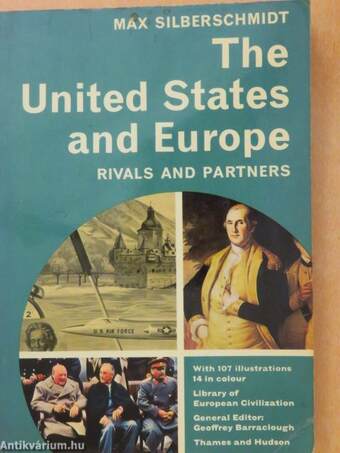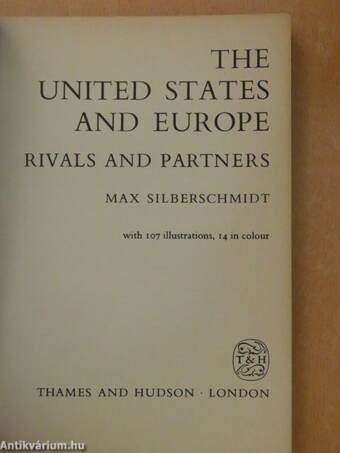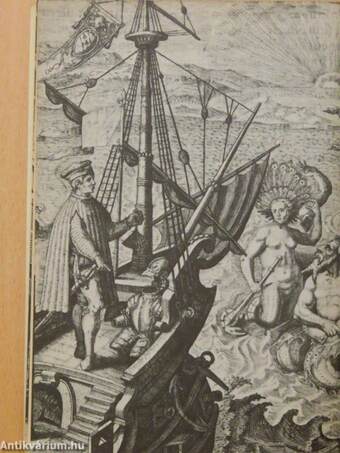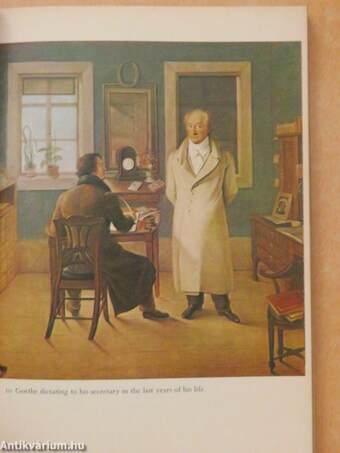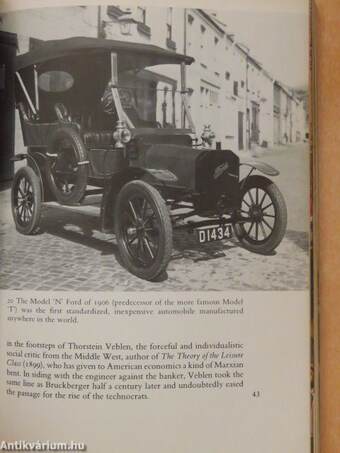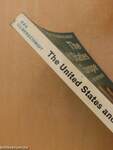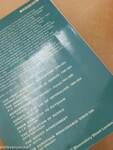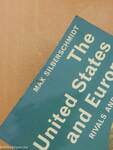1.117.562
kiadvánnyal nyújtjuk Magyarország legnagyobb antikvár könyv-kínálatát
The United States and Europe
Rivals and Partners
| Kiadó: | Thames and Hudson Ltd. |
|---|---|
| Kiadás helye: | London |
| Kiadás éve: | |
| Kötés típusa: | Ragasztott papírkötés |
| Oldalszám: | 216 oldal |
| Sorozatcím: | T & H |
| Kötetszám: | |
| Nyelv: | Angol |
| Méret: | 21 cm x 15 cm |
| ISBN: | 0-500-33025-5 |
| Megjegyzés: | Fekete-fehér és színes fotókkal, illusztrációkkal. |
naponta értesítjük a beérkező friss
kiadványokról
naponta értesítjük a beérkező friss
kiadványokról
Fülszöveg
About this book
America has aroused strong emotions in Europe from the first. Alternately 'rivals' and 'partners', the two continents have always been closely linked - and never more so than in the present age of global conflict. Examining the United States and Europe since the Declaration of independence, the author argues that westward expansion - across both the American continent and the Pacific - was the central event in American nineteenth-century history. That process completed, the United States re-emerged onto the international scene, and, with its entry into World War I, became a power of world stature. Since then, it has gradually assumed the role of an imperial power in the Victorian mould, distributing economic and technological aid, engaging in treaties of friendship and protection, and embarking on wars such as those in Korea and Vietnam. The current danger is that it will lose sight of its original civilizing mission, and that internal protest will restrict it to... Tovább
Fülszöveg
About this book
America has aroused strong emotions in Europe from the first. Alternately 'rivals' and 'partners', the two continents have always been closely linked - and never more so than in the present age of global conflict. Examining the United States and Europe since the Declaration of independence, the author argues that westward expansion - across both the American continent and the Pacific - was the central event in American nineteenth-century history. That process completed, the United States re-emerged onto the international scene, and, with its entry into World War I, became a power of world stature. Since then, it has gradually assumed the role of an imperial power in the Victorian mould, distributing economic and technological aid, engaging in treaties of friendship and protection, and embarking on wars such as those in Korea and Vietnam. The current danger is that it will lose sight of its original civilizing mission, and that internal protest will restrict it to a domestic role.
Max Silberschmidt, Professor Emeritus of History at Zurich University, succeeds in giving far more than a narrative of European and American history: aided by a wide range of illustrations, he provides a valuable and original account of a relationship still crucial to world history.
Other books in the series of particular relevance
THE FIRST EUROPEAN REVOLUTION: 177&-1815 NORMAN HAMPSON
THE INDUSTRIALIZATION OF EUROPE: 1780-1914 w.o. HENDERSON
ROMANTICISM AND REVOLT: Europe 1815-1848 J.L. TALMON
EUROPE IN THE AGE OF IMPERIALISM: 1880-1914 HEINZ GOLLWITZER
FROM SARAJEVO TO POTSDAM A. J. P. TAYLOR
THE EVOLUTION OF RUSSIA OTTO HOETZSCH
THE SOVIET ACHIEVEMENT J. P. NETTL
THE EUROPEAN RENAISSANCE SINCE 1945 MAURICE CROUZET Vissza
Tartalom
CONTENTS
INTRODUCTION
AMERICA, THE EUROPEAN DREAM
Discovery and independence
American self-comprehension and self-assertion
The lure of America
Cultural pessimism
The triumph of technology
II
II 21 23
38
39
THE PARTING OF THE WAYS Upheaval
Westward expansion
American civilization' and the 'American system' The foundations of foreign policy
49
49 54
69 72
III CONVERGENCE AND DIVERGENCE 189(^1940
The struggle for world supremacy
America's imperial heritage
The Open Door policy
The claim to hegemony in Latin America
Intervention in Europe
Retreat from Europe
The search for a new image
Economic planning and the New Deal
The Neutrality Acts
Preparations for war
83 83
90 96 100 105
III
118 129 132 135
I
K
'i » A • K
.V M'jmm
IV THE UNITED STATES, SUPER-POWER OF THE
WEST 143
A new international configuration 143
East-West antagonism 150
The Soviet shadow 164
The Truman and Eisenhower eras 170
From Kennedy to Nixon 176
The economic substructure of transatlantic co-operation 180
EPILOGUE 193
SELECTED READING 205
LIST OF ILLUSTRATIONS 209
INDEX 212
Témakörök
- Idegennyelv > Idegennyelvű könyvek > Angol > Történelem > Európa története > Egyéb
- Idegennyelv > Idegennyelvű könyvek > Angol > Történelem > USA története
- Történelem > Idegennyelvű > Angol
- Történelem > Kontinensek szerint > Európa, európai országok története > Egyéb
- Történelem > Politika > Külpolitika > Egyéb
- Történelem > Legújabb kor > Egyéb
- Történelem > Kontinensek szerint > Amerika, amerikai országok története > Észak-Amerika
- Történelem > Újkor > Egyéb
- Történelem > Hadtörténet > Hadügy, hadviselés


